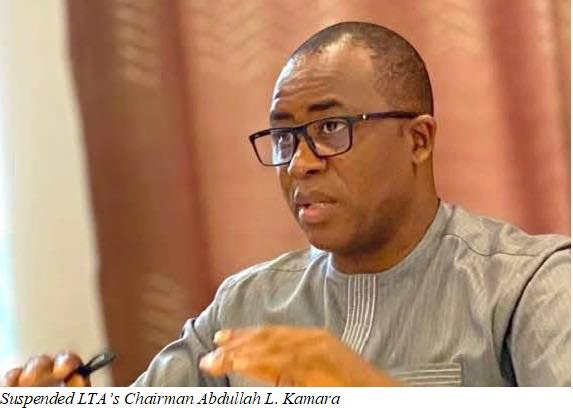MONROVIA, Liberia – A high-stakes corruption probe involving over US$3.5 million in questionable disbursements has taken a legal twist as suspended Acting Chairman of the Liberia Telecommunications Authority (LTA), Mr. Abdullai L. Kamara, petitions the court to remove him from the case, claiming a case of mistaken identity.
Kamara’s legal team on Tuesday filed a Motion to Drop Misjoined Party before Criminal Court “C”, citing Section 5.56 of Liberia’s Civil Procedure Law, which allows a party to be removed from a case at any point if it is proven that their inclusion was erroneous. According to Kamara’s argument, he was wrongfully listed as the Chief Executive Officer (CEO) of TAMMA Corporation, one of the companies implicated in the alleged financial misconduct.
The motion, supported by a board resolution dated May 10, 2024, asserts that Fabian Lavelanet has been TAMMA’s CEO for over a year, having officially replaced Kamara well before the Liberia Anti-Corruption Commission (LACC) launched its investigation. Kamara claims that both he and Lavelanet communicated this leadership transition to investigators early in the process, and that Lavelanet even provided a voluntary statement to that effect.
Despite these clarifications, the indictment issued by the Montserrado County Grand Jury continues to identify Kamara as the head of TAMMA, prompting the legal motion. The court has heard arguments from both sides, including pushback from LACC prosecutors who maintain Kamara’s relevance to the ongoing proceedings. A ruling on the motion has been reserved.
Allegations Rooted in GAC Audit Findings
The controversy stems from a sweeping General Auditing Commission (GAC) audit, which uncovered multiple financial irregularities tied to TAMMA Corporation and associated public agencies. The GAC flagged a series of payments made without signed contracts, procurement records, or proper justification. These transactions, reportedly involving public funds, have raised serious concerns about economic sabotage, theft of property, and misappropriation of entrusted funds — all charges now at the center of the criminal case.
Kamara, though suspended from the LTA, has not been directly accused of authorizing any specific disbursements. However, prosecutors allege that his association with TAMMA during the relevant period justifies his inclusion in the indictment, especially given the scale and nature of the alleged financial misconduct.
Legal and Institutional Implications
Kamara’s motion is not merely a technical defense. It raises critical questions about due process, prosecutorial accuracy, and the burden of proof in anti-corruption investigations. If his petition succeeds, it could establish a precedent for stricter evidentiary standards when public officials are named in financial crimes—particularly those involving private entities with evolving leadership structures.
At the same time, legal analysts warn against allowing procedural ambiguities to undermine broader efforts to combat corruption. “Whether it’s misjoinder or not, the state must demonstrate a clear connection between alleged wrongdoers and the financial misconduct,” noted a senior legal commentator. “But those accused cannot hide behind technicalities if substantive involvement can be proven.”
A Test for the Judiciary and the Anti-Graft System
The pending ruling on Kamara’s motion could have ripple effects across Liberia’s judicial and anti-corruption landscape. If the court grants the motion, it would signal a cautionary tale for prosecutors to tighten their evidentiary frameworks before moving forward with high-profile indictments. If denied, Kamara may be forced to fight his case on merit, facing the full weight of criminal allegations.
Either way, the case highlights persistent challenges in Liberia’s fight against corruption: the need for thorough investigations, accurate legal documentation, and institutional clarity in linking individuals to public financial misconduct. For now, the spotlight remains on the judiciary to decide whether Kamara is a wrongly named party—or a key player in one of the country’s most significant corruption cases to date.



